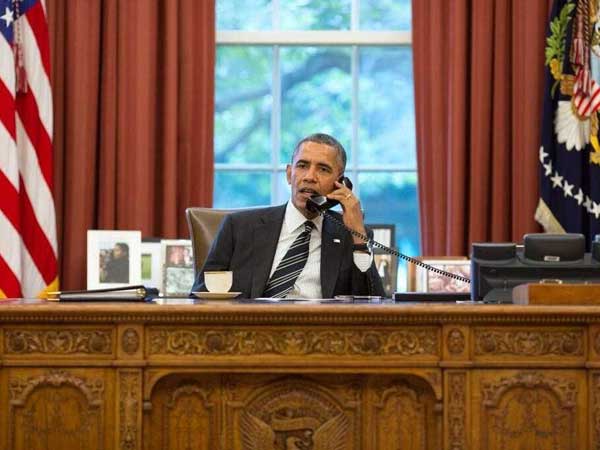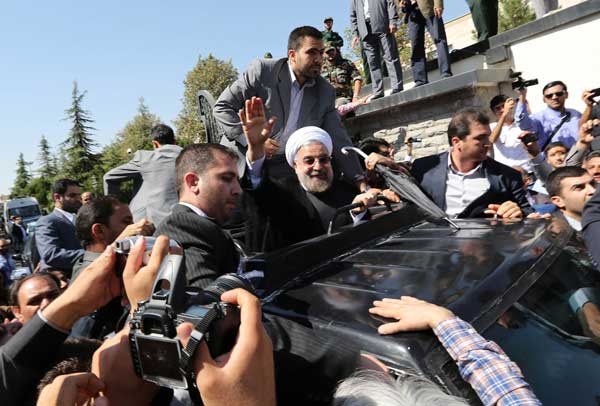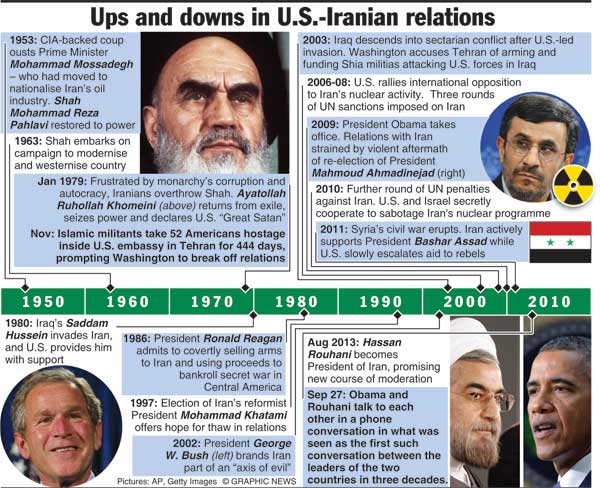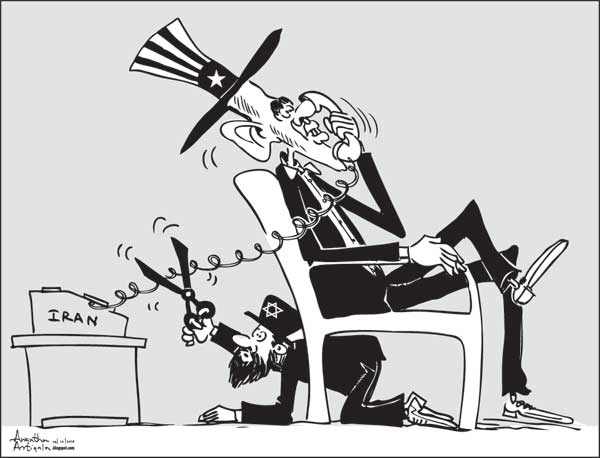Reply To:
Name - Reply Comment


.jpg) The United States President Barack Obama’s 15-minute phone conversation last Friday with Iran’s new President Hassan Rouhani has a few parallels in the post-World War II history. The world stood aghast at these shocking and unexpected events.
The United States President Barack Obama’s 15-minute phone conversation last Friday with Iran’s new President Hassan Rouhani has a few parallels in the post-World War II history. The world stood aghast at these shocking and unexpected events.
Two such earth-shattering political events were US President Richard Nixon’s visit to China in 1972 and Egyptian President Anwar Sadat’s visit to Israel in 1977. The two events changed the course of world politics for the better, underscoring the adage that compromise is better than confrontation or pow-wow is better than war-war.
Nixon’s visit to China took place against the backdrop of the Vietnam war which had turned into a bloody quagmire or a nightmare for the United States with the American troops being accused of carrying out mass-scale killings – the My Lai massacre, for instance – and using chemical weapons. At the time when the visit took place, the US had not recognised China, which was helping North Vietnam in its war against the US and the US-backed South Vietnamese regime.
Nixon’s visit also came at a time when the US-Soviet Cold War was at peak and China’s relations with the Soviet Union were souring. It was indeed a master stroke by Nixon’s National Security Advisor Henry Kissinger who grabbed the opportunity in what later came to be known as ping-pong diplomacy. It all began with Beijing’s invitation to a US table tennis team taking part in a competition in Japan to visit China. Months later, Washington reciprocated by inviting the World Champion Chinese team to visit the US.
Unbeknownst to even the US State Department and Congress, Nixon remarked, “We simply cannot afford to leave China outside the family of nations,” and encouraged Kissinger to restore relations with China. The secrecy was because any move to establish relations with Communist China was considered a great betrayal by the US political leadership and the media then.
Nixon and Kissinger worked through clandestine channels in Pakistan and Romania and succeeded in establishing contacts with China. One issue over which the two countries refused to compromise was Taiwan. The US had recognised Taiwan as the legitimate state to represent the Chinese people and signed a defence treaty to protect it from any attack from an outside force, meaning China.
Both the US and China, however, sorted out the other differences -- Vietnam, the Soviet Union and Japan – and this compromise paved the way for Nixon to visit China in February 1972 and sign the Shanghai Communiqué,” regarded as one of the twentieth century’s most important diplomatic documents.
Similarly, Sadat’s visit to Israel in 1977 also jolted world politics. Sadat, working through Romanian diplomatic contacts, conveyed the message to Israeli Prime Minister Menachem Begin and embarked on the visit considered scandalous by Egyptians and the people in the rest of the Arab world. Today many Arab and Islamic countries which ostracised Egypt for making peace with Israel, themselves have entered into peace treaties with the Zionist state or maintain overt or covert ties with it.
If Nixon’s visit to China and Sadat’s visit to Israel were high on the political Richter scale, last week’s Obama-Rouhani phone call was low on the scale, though it made a few ripples and shook Israel’s political leadership. We say it is low on the Richter scale because the two sides only broke the ice in an informal manner and there is a long way to go in terms of building trust that could pave the way for restoring diplomatic relations. Apart from this, Obama, who initially showed political courage that could have put him on par with Nixon and Kissinger, has later begun to wilt under Israeli pressure.
Yet, the phone call, which took place just before Rouhani was about to leave the US after he attended the 68th UN General Assembly sessions in New York, was significant. It was the first time that a US president had spoken to an Iranian leader since the relations were frozen in 1979 in the aftermath of Iranian students laying siege to the US embassy in Teheran, sparking a hostage crisis.
The Obama-Rouhani phone talk was preceded by a 30-minute groundbreaking one-on-one meeting between US Secretary of State John Kerry and his Iranian counterpart Javad Zarif in New York last Thursday. The main topic of their discussion was Iran’s nuclear programme. The meeting took place in a friendly and hope-stirring manner because the two men knew each other and had met informally. This was when Kerry was a Senator and Zarif was Iran’s permanent representative at the UN in New York.
On Friday, President Rouhani tweeted: “In phone convo, President #Rouhani and President @BarackObama expressed their mutual political #will to rapidly solve the #nuclear issue.”
Twitter also had a picture that showed President Obama conversing with the Iranian President over the phone. Obama later told the media: “The two of us discussed our ongoing efforts to reach an agreement over Iran’s nuclear programme. I reiterated to President Rouhani what I said in New York {addressing the UN General Assembly sessions}: While there will surely be important obstacles to moving forward, and success is by no means guaranteed, I believe we can reach a comprehensive agreement.”
At the end of the conversation, Rouhani said in English: “I express my gratitude for your hospitality and the phone call. Have a good day, Mr. President.” Obama replied in English and Farsi: “Thank you. Khodahafez (May God protect you).”

Since the 15-minute phone call, an upbeat Iran, despite rumblings by some hardliners in the government, has further softened its attitude towards the US, with some reports saying that Iran’s spiritual leader Ali Khamenei has agreed to stop the “Death to America” slogan, a usual cry after Friday prayers. Iran is also set to announce a major compromise at the next round of talks with the P5+1 nations comprising the US, Russia, Britain, France and China – the five permanent members of the Security Council -- and Germany. The talks will take place on October 15 in Geneva.
Iran is in a position to compromise on the nuclear issue, because it has apparently acquired the required level of enrichment for the peaceful use of the nuclear energy. But it is also no secret that Iran is feeling the pinch of the US sanctions. Iran is finding it difficult to sell its oil and gas because many countries including Sri Lanka do not want to be punished by the US. Rouhani told the UN General Assembly that Iran posed no threat to the world and that the sanctions imposed by the US were “violent — pure and simple” and “intrinsically inhumane”.
Iran’s objective in improving ties with the US is probably aimed at easing the sanctions, though it dismisses the connection between lifting the sanctions and the possible compromise. For the United States, an Iran with which it can discuss matters is much better than an Iran which is out-and-out hostile. For the United States, Iran’s neutrality is important in protecting US interests in Iraq, Afghanistan and Bahrain.
But the hitch is Israel, which has been agitated over US-Iran moves aimed at a thaw in relations. Obama informed Congress and Israel about the phone call before it took place. Yet, Israeli Prime Minister Benjamin Netanyahu who arrived in New York this week for the UN General Assembly sessions and a meeting with Obama expressed his displeasure. In his address to the UN, he warned the world not to be fooled by Iran’s charm offensive.
Claiming that Iran has not given up its nuclear weapons programme though the hardline Iranian President Mahmoud Ahmadinejad stepped down from office this year, Netanyahu said: “When it comes to nuclear weapons the only difference between the two (presidents) is that Ahmadinejad is a wolf in wolf’s clothing, while Rouhani is a wolf in sheep’s clothing who thinks he can pull the wool over the eyes of the international community.”
He warned that Israel would act alone militarily to stop an Iranian bomb if necessary and insisted that Iran not be allowed to keep any enriched uranium in any diplomatic deal.

Following Netanyahu’s outburst, the US went into reverse. Obama in a tone that was in sharp contrast to the one that had shaped his phone call with Rouhani warned Iran that all options, including the military option, had not been taken off the table.
“We take no options off the table, including military options, in terms of making sure that we do not have nuclear weapons in Iran,” Obama said, adding that Iran must take verifiable steps, through actions and not just words, to prove it is meeting “international obligations fully and that they are not in a position to have a nuclear weapon.”
Obama’s words made Iran angry. Foreign Minister Zarif said the “flip-flop” policy destroys trust and undermines US credibility.
Despite this minor blow to the moves aimed at improving the US-Iran ties, progress towards any thaw in the frozen relations between the two countries depends on Iran’s compromise at the October 15 meeting in Geneva with P5+1 nations and the United States’ willingness to accept the Iranian offer. In the past, the US, perhaps in a bid to appease Israel, has shifted the goal post away each time Iran came close to meeting the requirements set by the P5+1.
If the two countries can agree on the nuclear issue, they can sit together and discuss other key issues that are vital for regional and world peace. These issues include the security of Iraq, the future of Afghanistan after the US troop withdrawal next year, the crisis in Syria, the possible threat from Hezbollah, the fears of Israel, the Shiite uprising in Bahrain, the menace of terrorism, the worries of Saudi Arabia and the price of oil and gas.